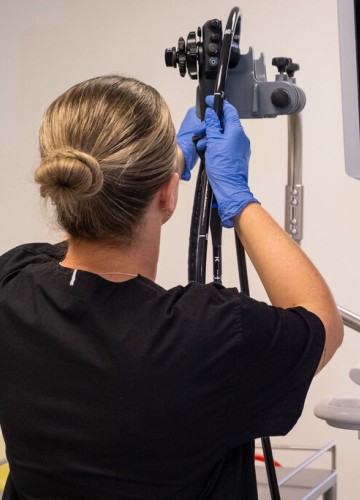Home / Procedures & Investigations / Gastroscopy
Gastroscopy
Gastroscopy is an examination of the inside lining of the oesophagus (gullet), stomach and duodenum (small intestine). It allows your specialist to investigate symptoms such as reflux, pain, or swallowing difficulties.

What is involved in gastroscopy?
During a gastroscopy a long flexible digital camera (gastroscope) is passed in through the mouth and down into the oesophagus, stomach and duodenum.
The picture from the digital camera is shown on a video screen so that your specialist can see the lining of your oesophagus, stomach and duodenum.
If necessary, polyps can be removed through the scope. Tissue samples (biopsies) can also be taken during the procedure.
Gastroscopy is the most accurate to examine the inside lining of the oesophagus, stomach and duodenum. It can be useful to:
investigate symptoms such as reflux or difficulty swallowing (dysphagia)
look for causes of iron deficiency or anaemia, including ulcers or coeliac disease
The Examination
The examination is an outpatient procedure. It usually takes about 15 minutes.
Our team of specialists and nurses are experts at conducting gastroscopy. They will answer any questions that you have about having a gastroscopy and will make sure that you are safe and comfortable throughout your procedure.
Step 1
When you arrive for your gastroscopy you’ll be asked to change into a gown. You’ll be brought into the endoscopy suite. Your specialist will offer you some local anaesthetic throat spray. This helps to numb the back of your throat.
Step 2
Your specialist may also offer you some sedation. Sedation can help to make sure you are comfortable throughout the procedure. You may choose to have your gastroscopy without any sedation. Please discuss this with your specialist.
Step 3
You lie on your side for the examination which will last about 15 minutes.